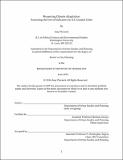Measuring climate adaptation : assessing the use of indicators in U.S. coastal cities
Author(s)
Plovnick, Amy (Amy Rebecca)
DownloadFull printable version (1.532Mb)
Other Contributors
Massachusetts Institute of Technology. Department of Urban Studies and Planning.
Advisor
Mariana Arcaya.
Terms of use
Metadata
Show full item recordAbstract
In response to the growing threat of climate change, in recent years many U.S. cities have developed climate adaptation plans. However, they have made limited progress implementing these plans and even less progress evaluating the effectiveness of them. Indicators have the potential to help cities track the implementation and effectiveness of their adaptation strategies. They have been used in many fields to simplify complex systems, measure achievement, reflect changes over time, facilitate communication and information exchange, allow for comparison between places and provide relevant information to decision-makers. To date there has been a lack of information on whether U.S. cities are using indicators in their adaptation planning. Based on an analysis of adaptation plans and interviews with staff in nine large coastal cities in the United States, this thesis finds that most cities are not using indicators to measure their adaptation efforts, although several cities are considering developing them. It also finds that cities face a number of barriers to using adaptation indicators, including those related to resources, information, technical challenges, and organizational structure. Adaptation indicator sets and frameworks developed by research organizations and non-profits can help cities overcome some of these barriers and select and use adaptation indicators. This thesis concludes by providing recommendations for cities and nonprofit and research organizations for developing quality indicators, overcoming barriers and advancing the state of knowledge about adaptation indicators.
Description
Thesis: M.C.P., Massachusetts Institute of Technology, Department of Urban Studies and Planning, 2016. This electronic version was submitted by the student author. The certified thesis is available in the Institute Archives and Special Collections. Cataloged from student-submitted PDF version of thesis. Includes bibliographical references (pages 106-113).
Date issued
2016Department
Massachusetts Institute of Technology. Department of Urban Studies and PlanningPublisher
Massachusetts Institute of Technology
Keywords
Urban Studies and Planning.